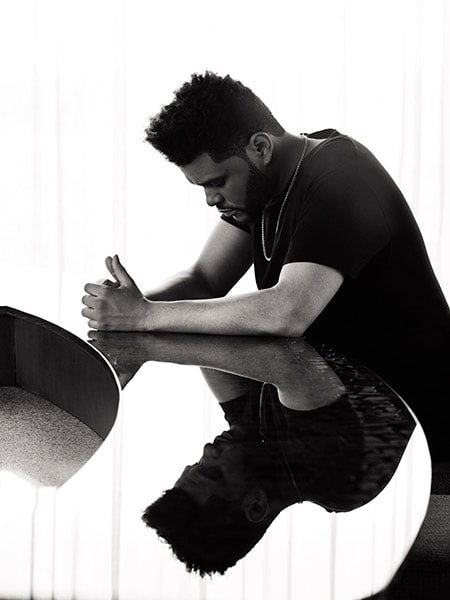The Weeknd rakes in $92 million as music goes freemium
Physical album sales and digital downloads are down. But more people are listening to more music than ever
.jpg?im=Resize,width=600,aspect=fit,type=normal)
.jpg?im=Resize,width=600,aspect=fit,type=normal)
 The Weeknd wears a black t-shirt by Saint Laurent Paris gold chain artist's own
The Weeknd wears a black t-shirt by Saint Laurent Paris gold chain artist's own
Image: Jamel Toppin for Forbes
Steve jobs would have been the logical choice to headline the launch of Apple’s eponymous streaming service, but by the time the tech giant rolled out Apple Music two years ago, he was busy putting dents into faraway universes. In his place was a pair of young musicians who walk the line between hip-hop, pop and R&B: Drake and The Weeknd. The latter stunned the crowd with the first-ever live performance of his new single ‘Can’t Feel My Face’, which premiered on Apple Music and has generated more than 1.5 billion spins across all streaming platforms.
The Weeknd knows as well as anyone that streaming isn’t the future of music—it’s the present. As digital downloads and physical sales plummet, streaming is increasing overall music consumption—since their Apple appearances, Drake (No 4 on our list at $94 million) and The Weeknd (No 6, $92 million) have clocked a combined 17.5 billion streams—and that creates other kinds of monetisation, including touring revenue.
“We live in a world where artists don’t really make the money off the music like we did in the Golden Age,” says The Weeknd, 27. “It’s not really coming in until you hit the stage.”
“The reason the Weeknds and Drakes of the world are exploding is a combination of a global audience that’s consuming them freely at a young age [and that] they just keep dropping music,” Live Nation chief Michael Rapino says. “They’re delivering an ongoing, engaged dialogue with their fan base.”
The model of making music available cheaply in order to cash in on touring and endorsements has been taken to its logical conclusion by Chance the Rapper (No 95, $33 million). The 24-year-old has never sold a physical album or signed a record deal in his life he has only freely distributed his work via streaming services. He generates enough spins to make several million dollars that way. And he’s cashing in big-time on lucrative festival gigs and arena dates, as well as deals with brands like Apple and Kit Kat. It’s akin to the freemium model that’s worked so well for apps ranging from Tinder to Candy Crush—give your stuff away to the many and then soak a smaller group of devotees.
It’s the model The Weeknd has pursued from the beginning of his career. The son of Ethiopian immigrants who fled during the east African famine of the 1980s, he was born in Toronto and raised by his mother and grandmother. At 17, he dropped out of school and ran away from home. A decade earlier, that might have been the end of the road for him.
But in 2010, he started recording music—a genre-bending party blend—and distributed it free on YouTube in a series of mixtapes, picking The Weeknd as his mysterious nom de plume. “I didn’t want to put a face to it,” he says. “I wanted to create a fan base that loved me for my art.” In the old entertainment economy, he would have waited to be discovered by a record label. Instead, that fan base found him, and all those free streams enabled him to force record labels to bid on him.
As far as the future is concerned, The Weeknd is smartly eyeing other parts of the entertainment economy that have been touched by the streaming revolution.
“I kind of treat my albums like films when I write them, telling one big story,” he says, before revealing his next step: “More visual candy and hopefully a venture into my first true love, cinema.”
Netflix, you’re on notice.
First Published: Jul 19, 2017, 14:48
Subscribe Now